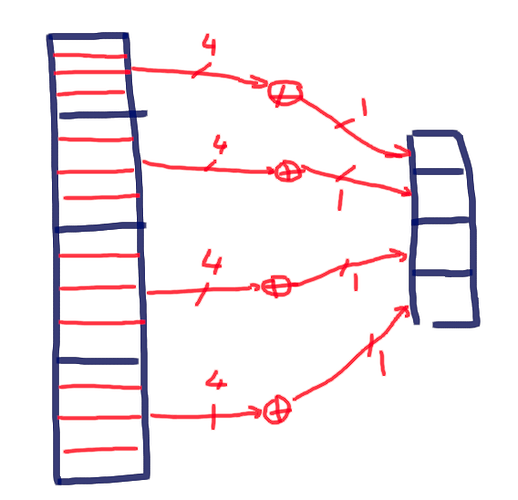Hi everyone,
I’m trying to write a TensorIR program to reduce a 16 element vector piece-wise into a 4 element vector. Here an drawing:
Here TVM Script code for this:
from tvm import tir
from tvm.script import tir as T
@T.prim_func
def reduce(input0: T.handle, output0: T.handle) -> None:
A = T.match_buffer(input0, (16,), dtype="float32")
B = T.match_buffer(output0, (4,), dtype="float32")
for i0, i1 in T.grid(4, 4):
with T.block("piecewise-reduce"):
vi0 = T.axis.spatial(4, i0)
vi1 = T.axis.reduce(4, i0+ i1*4)
with T.init():
B[vi0] = 0.0
B[vi0] = B[vi0] + A[vi1]
sch = tir.Schedule(reduce)
block = sch.get_block("piecewise-reduce")
l0, l1 = sch.get_loops(block)
sch.reorder(l1,l0)
The issue come up when calling sch.reorder(l1,l0). This throws an error: telling
Error message: The block tir.Block#0 is required to have an affine binding (Full error message at the bottom)
Here my questions:
- Does anyone see an issue in the TIR script?
- Is there maybe a better way to describe the reduction, I’m intending to do? I definitely want to call scheduling primitives like
reorderon it afterwards? - Why does reorder not work here?
vi0andvi1are kinda independent?
Btw, the example is boiled down from a bigger TVM Script program (with way more axes), the sch.reorder in this case if just a demo.
Thanks in advance,
Michael
CC: @Hzfengsy @tqchen @jinhongyii @MasterJH5574 @yzh119
File "/usr/tvm/python/tvm/tir/schedule/_type_checker.py", line 340, in wrap
return func(*args, **kwargs)
File "/usr/tvm/python/tvm/tir/schedule/schedule.py", line 874, in reorder
_ffi_api.ScheduleReorder(self, ordered_loops) # type: ignore # pylint: disable=no-member
File "tvm/_ffi/_cython/./packed_func.pxi", line 332, in tvm._ffi._cy3.core.PackedFuncBase.__call__
File "tvm/_ffi/_cython/./packed_func.pxi", line 263, in tvm._ffi._cy3.core.FuncCall
File "tvm/_ffi/_cython/./packed_func.pxi", line 252, in tvm._ffi._cy3.core.FuncCall3
File "tvm/_ffi/_cython/./base.pxi", line 182, in tvm._ffi._cy3.core.CHECK_CALL
File "/usr/tvm/python/tvm/_ffi/base.py", line 476, in raise_last_ffi_error
raise py_err
tvm.tir.schedule.schedule.ScheduleError: Traceback (most recent call last):
2: tvm::runtime::PackedFuncObj::Extractor<tvm::runtime::PackedFuncSubObj<tvm::runtime::TypedPackedFunc<void (tvm::tir::Schedule, tvm::runtime::Array<tvm::tir::LoopRV, void> const&)>::AssignTypedLambda<tvm::runtime::Registry::set_body_method<tvm::tir::Schedule, tvm::tir::ScheduleNode, void, tvm::runtime::Array<tvm::tir::LoopRV, void> const&, void>(void (tvm::tir::ScheduleNode::*)(tvm::runtime::Array<tvm::tir::LoopRV, void> const&))::{lambda(tvm::tir::Schedule, tvm::runtime::Array<tvm::tir::LoopRV, void> const&)#1}>(tvm::runtime::Registry::set_body_method<tvm::tir::Schedule, tvm::tir::ScheduleNode, void, tvm::runtime::Array<tvm::tir::LoopRV, void> const&, void>(void (tvm::tir::ScheduleNode::*)(tvm::runtime::Array<tvm::tir::LoopRV, void> const&))::{lambda(tvm::tir::Schedule, tvm::runtime::Array<tvm::tir::LoopRV, void> const&)#1}, std::__cxx11::basic_string<char, std::char_traits<char>, std::allocator<char> >)::{lambda(tvm::runtime::TVMArgs const&, tvm::runtime::TVMRetValue*)#1}> >::Call(tvm::runtime::PackedFuncObj const*, tvm::runtime::TVMArgs, tvm::runtime::TVMRetValue*)
1: tvm::tir::TracedScheduleNode::Reorder(tvm::runtime::Array<tvm::tir::LoopRV, void> const&)
0: tvm::tir::ConcreteScheduleNode::Reorder(tvm::runtime::Array<tvm::tir::LoopRV, void> const&)
ScheduleError: An error occurred in the schedule primitive 'reorder'.
The IR with diagnostic is:
# from tvm.script import ir as I
# from tvm.script import tir as T
@I.ir_module
class Module:
@T.prim_func
def main(input0: T.handle, output0: T.handle):
T.func_attr({"global_symbol": "reduce"})
A = T.match_buffer(input0, (16,))
B = T.match_buffer(output0, (16,))
with T.block("root"):
T.reads()
T.writes()
for i0 in range(4):
for i1 in range(4):
# tir.Block#0
with T.block("reduce"):
^^^^^^^^^^^^^^^^^^^^^^^
vi0 = T.axis.spatial(4, i0)
^^^^^^^^^^^^^^^^^^^^^^^^^^^
vi1 = T.axis.reduce(4, i0 + i1 * 4)
^^^^^^^^^^^^^^^^^^^^^^^^^^^^^^^^^^^
T.reads(A[vi1])
^^^^^^^^^^^^^^^
T.writes(B[vi0])
^^^^^^^^^^^^^^^^
with T.init():
^^^^^^^^^^^^^^
B[vi0] = T.float32(0)
^^^^^^^^^^^^^^^^^^^^^
B[vi0] = B[vi0] + A[vi1]
^^^^^^^^^^^^^^^^^^^^^^^^
Error message: The block tir.Block#0 is required to have an affine binding
